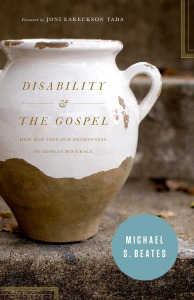Wednesday, September 20, 2023

 As part of the student fellowship program at the Center for Apologetics and Cultural Engagement, we work with our student fellows to develop book reviews about significant books that overlap their interests with those of the Center. The following review of Michael S. Beates’s Disability and the Gospel is part of that ongoing initiative.
As part of the student fellowship program at the Center for Apologetics and Cultural Engagement, we work with our student fellows to develop book reviews about significant books that overlap their interests with those of the Center. The following review of Michael S. Beates’s Disability and the Gospel is part of that ongoing initiative.
Throughout history, disabled individuals have suffered on the margins of church and society. They have often been segregated from church communities due to inaccessible locations and inaccessible people. Through either hostility or ignorance, the Christian church has put barriers between themselves and disabled individuals. In Disability and the Gospel, Michael S. Beates expounds on the struggles and stories of what he refers to as the “disability community,” challenging those who have marginalized the disability community in society or in their churches.
Disability in Scripture
First, Beates tracks how God interacts with those who are directly affected by disability throughout Scripture. In the first chapter, he looks at the testimony of the Old Testament and notes how God is portrayed as both the “ultimate source and ultimate solution” (32) to disability. God is completely sovereign over his creation despite its brokenness, and as a result, the stories of disabled individuals find fulfillment in the gospel.
In the Gospels, Jesus frequently interacts with and affirms the dignity of disabled individuals. Beates continues to highlight the Holy Spirit’s work through disabled individuals in the New Testament. He surveys how literature from different eras views the disability community. In particular, Beates highlights the modern era, describing the substantive, relational, and functional views of the image of God and how they interact with approaches to disability.
Disability in Society
Lastly, Beates takes a look at contemporary voices concerning disability in both secular and Christian cultures. In a variety of ways, secular society has begun to question the sanctity of life in the public sphere. Consequently, it has adopted a posture towards individuals with disabilities that is borderline utilitarian. As an example, Beates points to the perspective of Peter Singer, a professor of bioethics at Princeton University. Dr. Singer argues that the only meaningful difference between a disabled, unborn child and a pig is the fact that the child is a homo sapien.
Beates argues that society is shifting in its view of disabled individuals, growing to view them as ‘non-contributors’ to society. This mindset is dangerous since it has been the rationale for mass genocides throughout world history. Indeed, the Nazi party used ‘non-contributor’ language to justify violent action against the Jewish people. Today, this language may lead to encouraging euthanasia and abortion. More and more countries are legalizing these practices for those who have disabilities, out of a misguided assumption that disability prevents these individuals from living meaningful and fulfilling lives. Beates directly combats this school of thought by arguing that human life means far more than being a ‘normal’ homo sapien. There is value to all human life, regardless of which mold it comes in.
While acknowledging parts of the Christian church’s problematic history with the disability community, Beates outlines how a proper understanding of the Imago Dei provides insight into how church leaders can love the disability community well. Throughout the book, Beates highlights different groups of Christians who have not necessarily displayed direct hostility towards the disability community, but rather have displayed apathy and passivity. Passivity is not aggression; however, it is still a leading problem in regard to the disability community. Ignorance is not an excuse for inaction. Beates challenges Christians to educate themselves on the issues within the disability community and to play an active role in welcoming those with disabilities into the church by making it a more accessible place.
Towards a More Hospitable Kingdom
Disability and the Gospel paints an insightful picture about how God, in all aspects of his nature, sees and values those with disabilities. Beates successfully shines a light on the dangerous path that secular society is going down, a path which could eventually lead to the elimination of disabled individuals. Few scholars have delved into the threats lingering over the disability community; hence, Beates’s insights are extremely valuable. Furthermore, Beates dives into how ancient and modern societies have viewed the disability community, shining a light on the centuries of societal struggles this community has faced.
In closing, Beates provides some first steps on how the church can step up and fulfill the biblical mandate to “invite the poor, the crippled, the lame, and the blind” to the great banquet (Luke 14:13). He gives tangible advice to pastors, Christian leaders, and believers at large on how to fulfill the needs of the disability community. As Christians, our hearts should break knowing that Sunday services are some of the most segregated times in America for the disability community. The Church needs to do better. And through the process that Beates has outlined in Disability and the Gospel, there is hope for tomorrow’s kingdom.
Elyse Penton is a graduate student at Liberty University pursuing her M.Div. with a focus in biblical languages. She is also a student fellow with Liberty’s Center for Apologetics and Cultural Engagement. Her academic interests primarily center around Koine Greek and New Testament theology. She is also passionate about studying the church’s history with the disability community and practical apologetics to engage today’s culture. Once she graduates with her M.Div., she hopes to pursue doctoral studies. She enjoys reading, classical music, and deep conversations with friends.